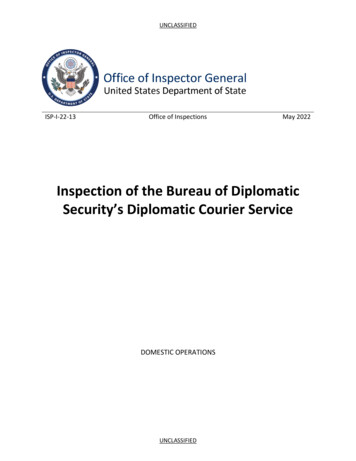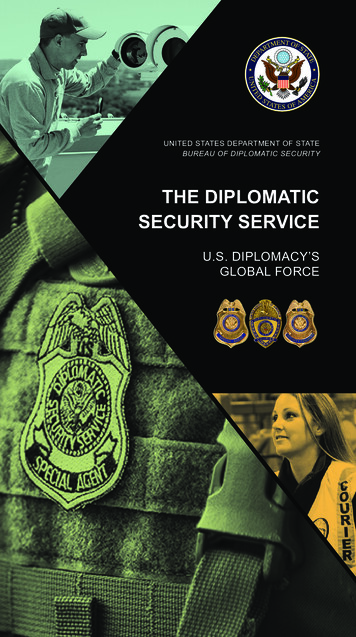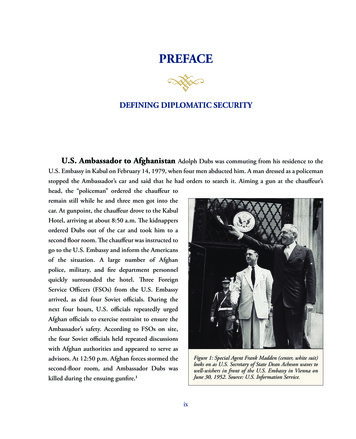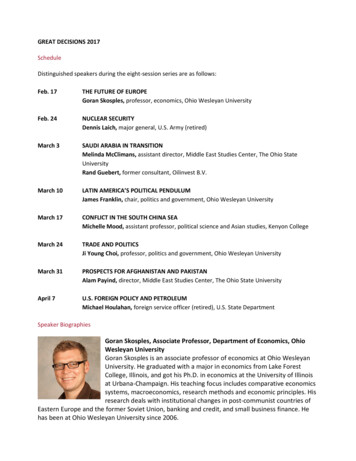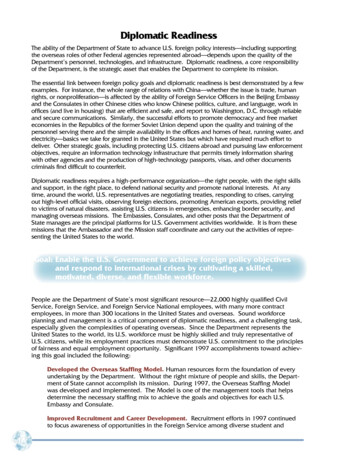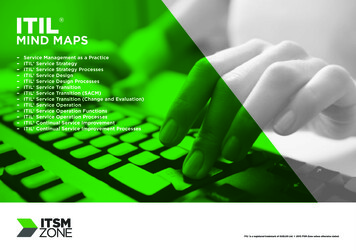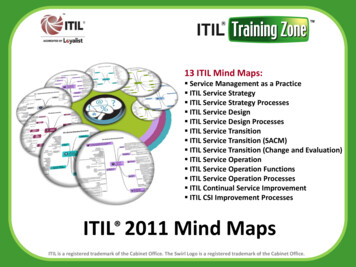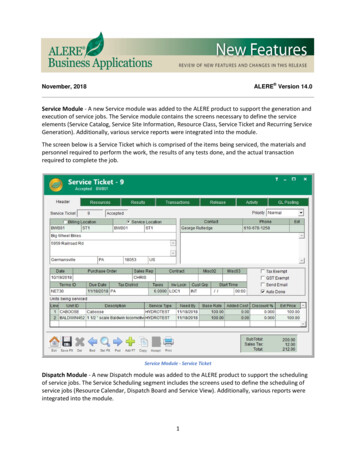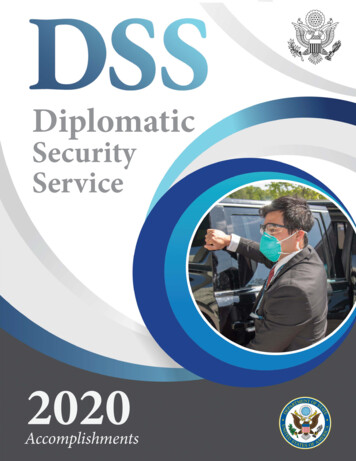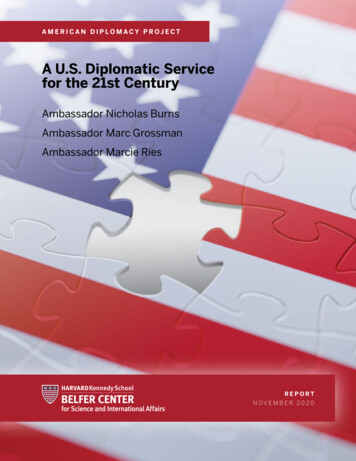
Transcription
A M E R I CA N D I P LO M ACY P R OJ ECTA U.S. Diplomatic Servicefor the 21st CenturyAmbassador Nicholas BurnsAmbassador Marc GrossmanAmbassador Marcie RiesREPORTNOVEMBER 2020
American Diplomacy Project:A U.S. Diplomatic Service for the 21st CenturyBelfer Center for Science and International AffairsHarvard Kennedy School79 JFK StreetCambridge, MA 02138www.belfercenter.orgStatements and views expressed in this report are solely those of the authors and do not implyendorsement by Harvard University, Harvard Kennedy School, or the Belfer Center for Scienceand International Affairs.Design and layout by Auge Gray Drake Collective WorksCopyright 2020, President and Fellows of Harvard CollegePrinted in the United States of America
F U L L P R OJ ECT N A M EAmerican Diplomacy ProjectA U.S. Diplomatic Servicefor the 21st CenturyAmbassador Nicholas BurnsAmbassador Marc GrossmanAmbassador Marcie RiesREPORTNOVEMBER 2020Belfer Center for Science and International Affairs Harvard Kennedy Schooli
iiAmerican Diplomacy Project: A U.S. Diplomatic Service for the 21st Century
Table of ContentsExecutive Summary.310 Actions to Reimagine American Diplomacy andReinvent the Foreign Service .5Action 1Redefine the Mission and Mandate of theU.S. Foreign Service . 10Action 2Revise the Foreign Service Act . 16Action 3Change the Culture. 20Action 4Focus Relentlessly on Diversity as aFirst-Order Priority.25Action 5Professional Education and TrainingShould be Top Priorities . 29Action 6Make the Personnel SystemMore Modern and Flexible . 36Action 7Adapt to the New World of Work withMid-Level Entry. 41Action 8Establish a Diplomatic Reserve Corps. 44Action 9Create a Stronger, More NonpartisanForeign Service . 49Action 10 Find New Spirit in a New Name .53Endnotes and Appendix . 56Belfer Center for Science and International Affairs Harvard Kennedy School1
Note from the AuthorsThis report focuses on the future of the Foreign Service of the United States. Itis not a comprehensive reform plan for the State Department. The vital CivilService component of the State Department needs to be freed from its antiquatedpersonnel system and other constraints; the Department should be a test bed forCivil Service reform. The Department’s courageous Locally Employed Staff arecrucial to America’s overseas diplomacy and their needs must be a priority forthe next administration. There are proud members of the Foreign Service at theU.S. Agency for International Development, Foreign Agricultural Service, ForeignCommercial Service, Animal and Plant Health Inspection Service, and U.S.Agency for Global Media who we hope will benefit from ideas in this report. Wetrust the future will hold more contact and collaboration among these groups.The three of us are retired members of the Foreign Service who served at everyrank from Junior Officer to Ambassador in our careers. We hope this nonpartisanreport will contribute to a national debate to support an irreplaceable instrumentof American power and effectiveness around the world.2American Diplomacy Project: A U.S. Diplomatic Service for the 21st Century
Executive SummaryThe United States Foreign Service is confronting one of the most profound crisesin its long and proud history. At a time of pandemic, recession, and mountingglobal challenges, our nation’s career diplomats find themselves without thesupport, funding, training, and leadership they need to represent the Americanpeople effectively overseas and in Washington, D.C.We argue in this report that the United States needs a strong and high performingForeign Service to defend our country and advance its interests in the 21st century.That is why President-elect Biden and Congress should launch a major bipartisaninitiative to revive, reform, and reimagine the Foreign Service.Many of the most serious challenges the United States will face in 2021 and beyondwill require our diplomats to take the lead. These include the return of great powercompetition, leading a global response to the pandemic and its consequences,supporting American companies overseas during a devastating recession,mounting a major effort on climate change, negotiating an end to the Afghan andIraq wars, and helping American citizens in every corner of the world who needthe support of their government. Morale in the State Department, however, is atan all-time low and efforts to promote greater racial and ethnic diversity havefailed just when the country needs women and men of all backgrounds as ourprimary link to nearly every country in the world. There are challenges to be metinside the Foreign Service, including an honest self-assessment of the Service’sinternal culture.Just as the United States succeeded in renewing both the military andintelligence agencies in recent decades, we must now do the same for ourdiplomats and diplomacy.Under the auspices of the nonpartisan American Diplomacy Project at theHarvard Kennedy School, we met during the past year in 40 workshops andmeetings with more than 200 people. They included serving State DepartmentOfficers, retired Foreign Service members, foreign diplomats, business leaders, andsenior U.S. military officers, including two former Chairmen of the Joint Chiefs ofStaff, as well as two former CIA Directors and retired intelligence officials.Belfer Center for Science and International Affairs Harvard Kennedy School3
We sought the advice of senior Trump administration officials, members of theBiden transition team, former National Security Advisors and Secretaries of State,as well as members of Congress and their staffs from both parties.In addition, we met more than 800 Americans in virtual conferences with thinktanks, the University of Nebraska–Lincoln, and with World Affairs Councils in onenational meeting and with chapters in Dallas/Fort Worth, Texas; Peoria, Illinois;Nashville, Tennessee; Cleveland, Ohio; and Boston, Massachusetts.In every meeting, we listened to, and benefited from, the advice of concernedcitizens who agree it is time to elevate diplomacy as a major national priority. Toaccomplish this, we must reimagine the Foreign Service for the current generationand those to come.Finally, we hope to honor with this call to action the women and men of theService who work each day to promote and protect our great nation in difficultand dangerous places around the world. They deserve our full support. The timehas come to help them rebuild the U.S. Foreign Service and Department of State.10 Actions to Reimagine AmericanDiplomacy and Reinvent the Foreign ServiceAround the world, the face of the United States is embodied in the women andmen of the U.S. Foreign Service. To ensure that we have the most robust andeffective diplomatic corps in the world, we recommend these 10 actions:1. President-elect Biden and Congress should define a new mission andmandate for the Foreign Service, and launch an urgent nonpartisaninitiative to reform, rebuild, and reimagine the diplomatic corps.4 Together, the President and Congress should restore the StateDepartment's lead role in executing the nation's foreign policyand reaffirm the role of American Ambassadors overseas as thePresident's personal representatives. They should strengthen budgetary support for the ForeignService so that it is the strongest and most able diplomatic corps inthe world.American Diplomacy Project: A U.S. Diplomatic Service for the 21st Century
2. Congress should pass a new Foreign Service Act to reshape the Servicefor the decades ahead and set the highest standards for diplomaticreadiness, expertise, and leadership. There have been only three such acts in the previous 100 years andthe most recent was 40 years ago. A new act would establish a newstrategic mandate and mission for a strengthened Foreign Serviceand guidelines for many of the actions proposed below. A new act,based upon what is best about the 1980 act, is essential to catalyzethe transformational change that is needed. Just as past Presidents and Congress undertook successfulinitiatives to renew the armed forces after Vietnam and theintelligence agencies after 9/11 and the Iraq War, a new act couldserve as the foundation for a true 21st century Foreign Service.3. Challenge the Foreign Service to transform its internal cultureby incentivizing greater innovation, smart risk taking, individualaccountability, inclusive management, and visionary leadership. Establish institutional service requirements for promotionto include participation in recruiting, service on promotion panels,teaching assignments at the Foreign Service Institute,and mentoring. Instill an ethos of stewardship of the profession of diplomacy bycreating a Seniors Panel of all diplomats with the rank of CareerAmbassador charged with promoting resilience, readiness, andinclusion for the diplomatic service.4. Direct a relentless focus on diversity as a first-order strategic priority.Diversity is an essential element of producing high performance. America’sdiplomats should be representative of the American people, their values,and their aspirations.The next Secretary and Deputy Secretary of State must lead this effort.They should: Take personal responsibility to achieve this goal. Appoint a Chief Diversity Officer and be transparent aboutprogress.Belfer Center for Science and International Affairs Harvard Kennedy School5
Seek legislation to establish and fund a large-scale diplomaticROTC program for under-represented college students seeking acareer in the Foreign and Civil Services. Eliminate structural and procedural bias within recruitment, entry,assignment, and promotion processes. Enforce accountability for diversity, inclusion, and mentoring byall managers. Make promotions from junior to mid-level to senior ranks dependenton success in helping to create a more diverse Foreign Service.5. Strengthen the professionalization of our diplomats through a vastlyexpanded career-long program of education and training that focuseson mastery of substantive foreign policy issues, diplomatic expertise,and leadership. Seek congressional authorization and funding for a 15 percentincrease in Foreign Service personnel levels to create a trainingfloat like that maintained by the U.S. military. We recommend anincrease of 2,000 positions over three years to meet this goal.6. Initiate a wholesale overhaul of the personnel system to make itmore modern, flexible, transparent, and strategically oriented to futurechallenges and workforce needs.6 Make multifunctional competence in political, economic, publicdiplomacy, consular, and management skills the standard forprofessional success and promotion by eliminating the individual“cones,” which separate Officers into job categories. After the 15 percent increase in positions is achieved, launch a fouryear commitment to increase the size of the Foreign Service by another1,400-1,800 positions to fill current and projected staffing gaps. Reduce the size of the massive embassies created to support thewars in Afghanistan and Iraq and other large overseas outposts. Prioritize development of regional and linguistic expertise throughmandatory multiple tours using languages studied. Instill more flexibility in personnel policies to address the needs ofa globally deployed workforce and their family members.American Diplomacy Project: A U.S. Diplomatic Service for the 21st Century
7. Create a defined mid-level entry program so that the Foreign Servicecan recruit and employ Americans with critical or unique skills in areassuch as technology, science, business, and engineering. This program musthave rigorous, transparent, nonpolitical entry and retention requirements,including worldwide availability. It can also be a vehicle to expand thediversity of the Foreign Service and provide for the return of some who leftthe Service in recent years.8. Seek legislative authorization and funding for a Diplomatic ReserveCorps, like the military, with annual training requirements and activationcommitments. This will create a surge capacity in the event of a nationalemergency or international crisis and open opportunities for citizens withspecial skills to support American diplomacy. Reservists would provide a positive connection between theircommunities and the Foreign Service.9. Create a stronger and more nonpartisan Foreign Service by expandingthe number of ambassadorial and senior Washington assignments forcareer professionals. The Department of State has more Senate-confirmedpolitical appointee positions than any other Executive Branch agency.1Currently, there is not a single serving career official in the 23 Senateconfirmed Assistant Secretary positions, which is unprecedented in themodern history of the State Department.2 The next administration should seek by 2025 to: Appoint career professionals to 90 percent of all ambassadorialpositions. Appoint a career professional to the position of Under Secretaryfor Political Affairs and one of the other five Under Secretariesof State. Appoint career professionals to 75 percent of all AssistantSecretary of State positions. Mandate these guidelines in legislation to promote astrengthened and more nonpartisan Foreign Service.This would bring the Foreign Service into symmetry with the smallnumber of political appointee positions in the senior ranks of themilitary, the Central Intelligence Agency, and the National SecurityAgency.Belfer Center for Science and International Affairs Harvard Kennedy School7
10. Rename the Foreign Service of the United States as the “UnitedStates Diplomatic Service” to signal transformation and to reinforcethe vital role our diplomats perform in service to our nation. A namethat begins with the term “foreign” and ends with “United States” is thereverse of how we should view America’s diplomats.8American Diplomacy Project: A U.S. Diplomatic Service for the 21st Century
The C Street lobby of the U.S. Department of State
Action 1Redefine the Mission and Mandateof the U.S. Foreign ServiceThe President and Congress should launch in early 2021 an urgent nonpartisaninitiative to revive, reform, rebuild, and reimagine the Foreign Service of theUnited States.The President should designate the State Department, and with it the U.S. ForeignService, as the lead U.S. government agency in executing relations with everycountry and international organization on the full range of diplomatic, political,security, and other issues.The mission of the Foreign Service is to represent the interests of the Americanpeople overseas through the 275 U.S. embassies and consulates3 in every part ofthe world and to provide foreign policy expertise in Washington. This centralmission will be increasingly vital in the decade ahead as our nation confronts thereturn of great power competition, especially an increasingly assertive China;the COVID-19 pandemic; a global recession, which makes economic diplomacyan ever increasing requirement; and the threats produced by climate change,terrorism, and trying to end wars in Afghanistan, Iraq, and elsewhere in ways thatsupport American interests and values.10American Diplomacy Project: A U.S. Diplomatic Service for the 21st Century
All Americans should want their Foreign Service to be the strongest, mostknowledgeable, and highest performing diplomatic corps in the world. America’sdiplomats should be the U.S. government’s deepest substantive experts onthe world outside our borders – the politics, economics, security, culture, andlanguages of each country on every continent.The Foreign Service, however, is facing one of the most profound crises in its longand proud history. It is underfunded and understaffed and in need of strongercareer and non-career leadership. In recent years, it has lost key personnel at theambassadorial and junior ranks. Its record on diversity is not acceptable.There are also crucial challenges that must be met inside the Foreign Service,including an honest self-assessment of the Service’s internal culture. Morale is at anall-time low. The Service is in danger of losing its capacity to serve the Americanpeople effectively.Belfer Center for Science and International Affairs Harvard Kennedy School11
That is why major reform is so urgent in 2021. We believe: The State Department should have a major role in formulating U.S.foreign policy along with other Cabinet agencies and the National SecurityCouncil. It should be clearly designated as the lead in executing the nation’sforeign policy through our Ambassadors and their embassy staffs. The next President should clearly reaffirm and reinforce the Ambassador’slead role as the President’s personal representative. This remains thekeystone to the successful coordination and functioning of America’srelationships with the rest of the world. Before taking up their duties, allAmbassadors receive a letter from the President detailing their authoritiesover U.S. government policies and personnel. While many governmentagencies have representatives stationed overseas in U.S. embassies andconsulates, the President should ensure that the Ambassador’s role isclear, paramount, safeguarded, and unassailable. Since 9/11, the role andauthority of Ambassadors has too often been challenged or overriddenleading to confusion and a lack of cohesiveness in some of our embassies.Our embassy country teams – the representatives of various federalagencies led by the Ambassador – work remarkably well as long as theAmbassador’s authority is acknowledged and respected.Together, the President and Congress should also expand the size of the ForeignService and provide it with far greater budgetary support. To start, the budgetshould be increased to create a 15 percent training float to radically increaseopportunities for professional education and training, which we recommend inAction 5. Fifteen percent is the number the military has used successfully. Thisincrease would be 2,000 personnel at a cost of approximately 400 million to beaccomplished over three years, which would allow that percentage of employees tobe in training at any given time. We believe it must be authorized and funded intothe future in the new Foreign Service Act we propose in Action 2. The act mustalso specify that these positions are for professional education and training andnot for filling other personnel shortfalls. 12After the 15 percent increase in positions is achieved, the President andCongress should launch a four-year commitment to increase the size ofthe Foreign Service by another 1,400-1,800 positions to fill current andprojected staffing gaps.American Diplomacy Project: A U.S. Diplomatic Service for the 21st Century
The next President and Congress should also improve integration,both in Washington and overseas, between the State Department andother agencies with foreign affairs officers, such as the U.S. Agencyfor International Development, the Commerce Department, and theAgriculture Department. Closer integration will provide greater and moreeffective strategic alignment of the men and women who represent usoverseas. In Washington, the State Department and Foreign Service should chair orco-chair the interagency working groups below the Deputies Committeeorganized by the National Security Council as some administrations havedone in
Ambassador Marc Grossman Ambassador Marcie Ries. American Diplomacy Project: A U.S. Diplomatic Service for the 21st Century Belfer Center for Science and International Affairs Harvard Kennedy School 79 JFK Street Cambridge, MA 02138 www.belfercenter.org
